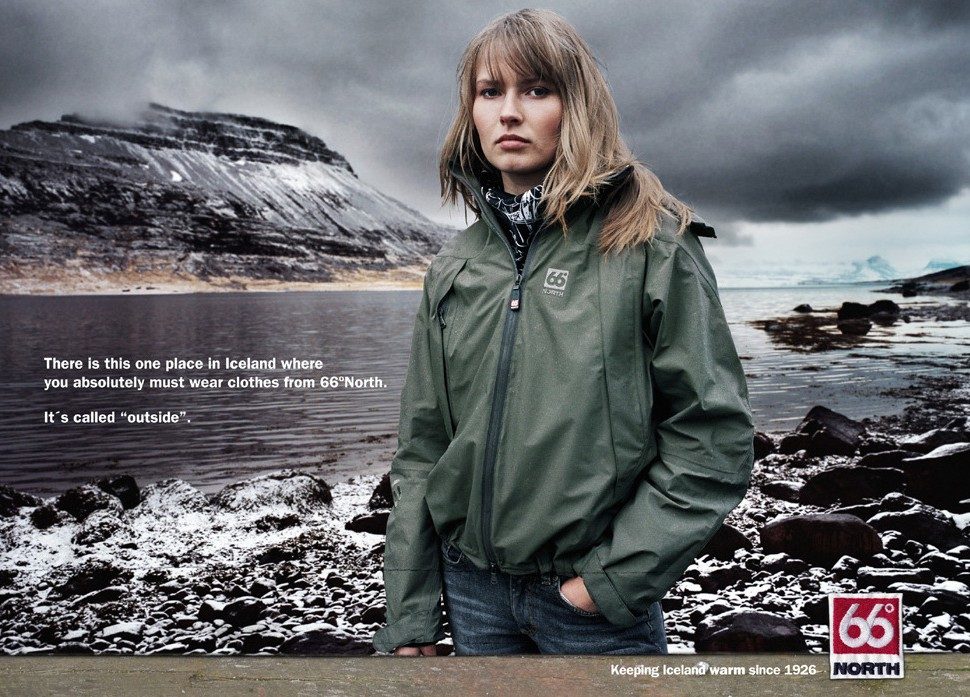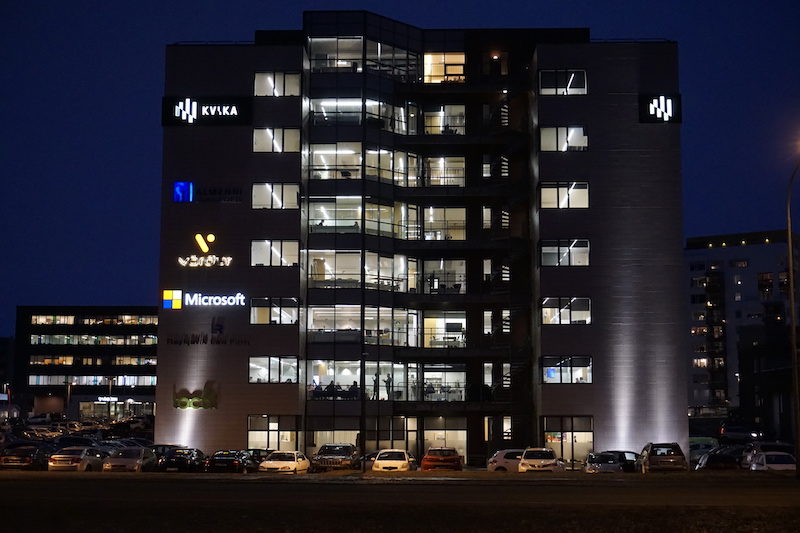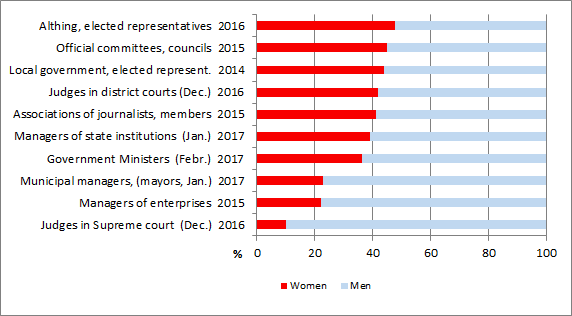Icelanders as ancestors of Vikings may be perceived as strong, stubborn and patriarchal whereas Vikings were surprisingly egalitarian. They founded one of the world’s early democracies when settling in Iceland. Always everyone’s opinion was equal. It's very important to know their culture before doing business with them.
Early start
Icelandic society is a young one – 2/3 of Icelanders (211K) are in working age (15-64 years) as in Iceland there’s a cultural drive to start your family early. Thus a lot of couples aged between 18-19 do have a child and start a family. What’s more an average Icelandic family consists of 6 people (4 kids). Most of Icelanders have two jobs at least or work at side projects. Taking into account their number (320 thousand) versus needs, which constantly rise annually especially with all the tourists, it’s a good approach. It’s even more so during summer period as due to insufficient number of working people they employ children even aged 13 to help them fill demand.
Cyber society
95% of households on Iceland is connected to the Internet and 72% actively uses Facebook. (Actually Qatar is the only country surpassing them, with an impressive ratio of 81%). Women make up 52% of users and men 48%. Cited survey also shows that social networking sites are mostly used by people aged 25-34, followed by people 18-24. Facebook groups are common among Icelanders and extremely useful. It's a true mine of knowledge. What’s more it’s way more certain that we’ll get a reply than when using emails – Icelanders have bad reputation when it comes to replying to emails. Also due to Icelanders’ ubiquitous presence in the Internet and Facebook it's best to advertise on the web. Especially bearing in mind low anonymity in Iceland resulting in more genuine recommendations. Most Icelanders are fluent with computers and also acquainted with newest technological trends. They are early adopters of new technologies and social platforms. Icelandic government is aware of that fact and initiated a campaign www.inspiredbyiceland.com to promote tourism among foreign colleagues of Icelanders. As a result, a 20% rise in inward tourism was noticed. Another campaign set to boost Iceland’s reputation around the world was www.icelandwantstobeyourfriend.com. Social media not only been used to boost tourism but also to rework Iceland’s constitution. Suggested changes had been published in a post with a request to comment and give feedback (sic!).Content that works best
In terms of content and images that work best to attract Icelanders, eg. in advertisement, it’s always family on first place. Broadly speaking family bonds, meetings, kids, health. On second place there’s tradition (everything from Vikings to sheep breeding), independence (also cultural and language distinctness), severe weather and nature conditions (hardness, cold baths, glacier walks, snow mobiles rides) and last but not least beauty of Icelandic nature (healthy and natural). By not understanding those features we won’t succeed in Iceland. As an example, Icelanders mock people with umbrellas. It’s almost a sign of weakness for them (true Vikings). So trading with umbrellas on Iceland may not be the best shot. But as it’s raining in Iceland almost every day – there’s definitely a niche. And that niche had been fulfilled by Icelandic world-famous company North 66 (on the market since 1926), which created a collection of outdoor clothing suited for severe climate of the island and hit home. They knew the problem, found solution but also were aware of Icelanders’ limitations.
Billboards-free
I’ve been all around Iceland including very distant places, in many small towns and all bigger cities (bigger in Icelandic reality), and nowhere I’ve found billboards as we know them – big signs standing next to the road or shiny in cities on random (all?) buildings. I need to admit that in cities there is resemblance of billboard in form of a ‘big poster’ but they are only placed on buildings which they advertise (like Bonus poster on Bonus shop) or as a way to indicate direction to get there (with arrows or kilometres). Thanks to that we can actually admire Iceland’s beautiful nature, not irrelevant products with insignificant brands.
Making first contact
Big factor that eases establishing relations with Icelanders is the fact that on Iceland there had never been social classes, thus the distance is shortened really quickly and salutations boil down only to first name – it applies to school system, work relations, business meetings and emails. Even in telephone directories people are listed by their first names. This is because of the way in which surnames are built - a combination of the father’s or mother’s first name plus ‘dottir’ (daughter) or ‘son’. For example son of Fridrik Olafsson - Gisli will be named Gisli Fridriksson and not Gisli Olafsson and daughter Birgitta Fridriksdottir. Also just as in the English language, Icelanders do not have a formal way of saying “you”. When needed, formality can be expressed through the accompanying vocabulary or the tone of voice.Face-to-face meetings
Once we go through the introductory phase and we’ll agree to have a meeting it’s good to learn few things about what we can expect.
Icelanders are sometimes perceived as uncommunicative or a bit withdrawn at first but that’s only if you consider excessive cheerfulness as a standard. Besides once you break the ice (public baths/hot tubs or beer in a pub work best) there are not many topics that would be taboo for Icelanders. There are few reasons for that – first is, again, their classless society, since taboos usually appear in cultures with strong class divisions. Here it’s just the opposite – Icelanders are laid back when it comes to rules on how to behave or taboos. Second, are the farming roots. People who grow up in farming society seem to be more open in many ways. Of course, same rules apply in Icelandic companies where the organisational structures are flat.
All that indicates that we shouldn’t be too concerned about what’s appropriate to say and what’s not. Nevertheless, we should be prepared for the same – any topic can be pulled out and we shouldn’t feel offended by their straightforwardness. Similarly it works with jokes. Icelanders are really cheerful and like to laugh at themselves but also to make jokes about others. It always helped to break the ice with strangers and made life easier when times were difficult.
Importance of speech
There’s one more tricky virtue of Icelandic communication style – the hidden suggestions. If an Icelander tells you “I’m going to the swimming pool”, it means “Hey, maybe you’d like to go with me to the swimming pool?”. Converting it to a business situation, when hearing “There’s not so many pictures in that presentation”, it means “Add them”. It’s because Icelanders are a high-context society, which means that not everything must be said directly or literally to be understood. That results from them being a small nation, living together on a small island. Due to the same reason body language is being rarely used and written agreements are considered less necessary (oral agreements are actually binding according to Icelandic law).
It points out one more thing, that Icelanders value keeping ones word therefore we should highly consider our promises and assurances. Same applies to punctuality since if we agreed to given hour we should be on time or at least inform about the delay. If we have any add-ons to the meeting in mind like showing PowerPoint presentation we should prepare it in advance so as not to delay the meeting because of that. What’s more, they highly value honesty therefore if we have any reservations about given proposal or agreement we should say it bluntly.
A normal way of greeting people or business partners on Iceland is by shaking their hand. Kissing is appropriate but only among women who know each other well. Exchange of business cards is welcomed at the end of business meeting.
When considering dress code, bear in mind that Icelanders are highly fashionable (it again results from the fact of living in a small country, where everybody knows everybody). Therefore it’s always in good taste to dress formally.
Business meeting at home
Icelanders value time (hence the punctuality), and therefore they try to make formal meeting as concise and aim oriented as possible. Yet, they also take delight in combining business with pleasure what very often means an invitation to hot tub or to their home to talk business further. Of course, at home with whole family or friends and food on the table it’s hard to concentrate on business, thus sometimes such business meetings might be less effective than expected.
It results from great value Icelanders hold for home and family but also in that way they want to know prospect business partner from broader perspective. If they are to consider our proposal they want to build it on friendship and trust and in that case business and pleasure are very often combined.
Knowing that Icelanders tend to talk business over meals and combining work and pleasure remember few kind acts:
- Icelanders often leave their shoes at the door when going home and one should follow that example when visiting anIcelandic home,
- Bringing small gifts from the visitor’s home country or foreign wine is highly appreciated,
- Learn few phrases in Icelandic – your hosts will be amazed, as it’s uncommon language and they don’t hear many foreigners trying to speak it.
- Icelanders are proud of their origins and their country. For example, they like when outsiders are amazed by their beautiful nature. That’s why, sometimes they ask directly what we think about Iceland. Be prepared to give some positive comments.
Closing the deal
Since Icelanders are fairly relaxed they’re not averse to taking risks. As a result, there is a large degree of openness for new ideas, innovative products and willingness to try something new or different, whether it applies to technology, business practices or investments. They often act on gut feelings and thus make quick decisions in terms of starting something new, yet when it comes to big decisions or finalising the deal they have tendency to be hesitant. To be more precise, they like to leave the final decision-making till the last minute so that they can add or change some conditions at last moment.
Be aware of that and you won't get discouraged if you don't get a full and quick reply.
The Icelandic way of management
Nowadays when we enter Icelandic company it’s sometimes difficult to spot the boss. Little hierarchy and informality in relations still prevails. What’s more it’s OK to disagree with the boss openly even in front of others.
Great emphasis is also placed on initiative and taking responsibility by employees. Thus, people are more likely to move to action without getting the boss’s okay. It’s OK to email or call people several levels below or above you. During meetings with a client or supplier, there is less focus on matching hierarchical levels therefore you’ll be seated or spoken to in no specific order.

What do they value
Icelander’s value punctuality and good organisation but at the same time give a lot of space for individual ideas and ways to achieve given outcome. They prefer to focus on one task at a time unless someone is skilled in multitasking but without significant drop in performance. Trust is built through business-related activities - by doing consistently good work and being reliable. But it’s during informal meetings, lunch or dinners that they are open to know you better and to hear out your ideas and proposals. Again, Icelanders put a great emphasis on personal contacts. Also in the business world they are very attached to the personal dimension of it. Considering the size of the Icelandic business community and its close network of personal contacts it is hardly surprising that Icelandic business leaders tend to value personal relations highly.
Icelandic managers
Icelandic managers are seen as straightforward, friendly, reliable, quick to solve problems and positive. Also they don’t mind being asked questions and are ready to discuss everything.
Icelanders are known for focusing on finding solution than dwelling on problems. (Some even say that they don't have problems only challenges). It’s sometimes achieved by making quick decisions without debating everything down to the core. Also very often Icelandic managers act on their gut feeling rather than careful planning. Nevertheless, all that doesn’t mean that they are stubborn. If they sense that their decisions were erroneous or need to be modified for some reason they are willing to change their minds. They are always open for debate and ideas sharing with employees. Sometimes it’s just more efficient to make quick decision by ignoring compromises.
Women are managers almost as often as men in various industries and fields.

No strategy, just do it
Icelandic way of doing business can be described by using nike’s slogan: “just do it”. Meaning to set off and let things take their course without a strong strategy. They’re saying “we’ll manage, as usual”. And if not, they can try something else, it's not the end of the world. It can be said that, an Icelandic model of running a business is 10% planning, 80% operation and 10% correcting mistakes (as contrasted with popular 80% planning and 20% operation). This approach is accompanied by a high error margin and willingness to accept the cost of correcting mistakes but at the same time is a quick one.
Knowing where to look for customers and how to present our company to them is half way to success in every country.















